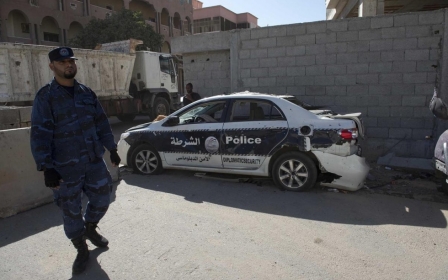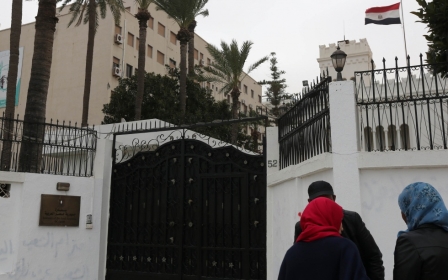Libya's 'renegade general' welcomed back into army's fold

Libya’s Tripoli-based parliament, the General National Council (GNC), has announced “war” on former renegade General Khalifa Haftar, who was officially welcomed back into the country’s armed forces over the weekend.
GNC head Omar al-Hassi issued the belligerent message on Tuesday, after Haftar’s forces announced that they had bombed Mitiga Airport just east of the capital Tripoli for the second day running.
Statements from Libya’s armed forces - loyal to the rival Tobruk-based parliament - over the past week have suggested that opposing militias could be pushed out of the capital shortly.
However, the fighting has continued to intensify and shows little sign of abating. After Tuesday morning’s assault on Mitiga Airport, a local resident complained that bombings were becoming part of the daily rhythm of life.
“We woke up to the sound of bombing. What kind of a life is this?" the man, who asked not to be named, told MEE contributor Hassan Morajea.
‘PR stunt’
Mattia Toaldo, a policy fellow with the European Council on Foreign Relations, warned that the decision to reintegrate Haftar could be a serious step backwards for relations between Libya’s warring factions, despite hints that the battling politicians and their affiliated armed groups could be moving towards dialogue.
Recent weeks have seen minimal moves towards dialogue, with one or two signs of softening positions. On 18 November, for example, the HoR said it was talking about meeting in Ras Lanouf, a coastal town west of Benghazi - something that the HoR had been unable to do. The parliament had refused to hold any meetings in the militia-controlled capital, Tripoli, since being forced in August to relocate to the far-eastern town of Tobruk, some 150 kilometres west of the border with Egypt.
Despite this “very modest opening” in dialogue, the decision to restore Haftar could be a signal that the army is digging in for a long fight against the armed militia groups allied to its rival government, the GNC.
“A long campaign cannot be ruled out - the army has said that pacifying Benghazi could take between six months and three years,” Toaldo said.
In this context, he explained, there is no value in keeping up the “pretence” that there is a distinction between the official Libyan army and the forces under Haftar’s control.
“This decision formalises the existing co-operation between the forces. In fact, the army Chief of Staff is a former acquaintance of Haftar, and there was never much real separation.”
Security and policy analyst Wolfgang Pusztai agrees. For him, the move is purely a “public relations stunt.”
“Practically, the impact is nil," he told MEE.
Sanction slapping?
Though Haftar's reintegration will have little impact on the ground in Libya, it could have implications internationally.
Operation Dignity and the official army have been moving gradually closer for months, but some analysts suggest that the timing of the move cannot be overlooked, as rumours fly regarding the possibility of international sanctions against groups and individuals seen to be threatening the peace in Libya.
The UN last week slapped an assets freeze on Ansar al-Sharia affiliates in Benghazi and Derna. The move had been widely expected since the group pledged allegiance to Islamic State in October, but there are signs that this could be just the first in a string of such measures. Earlier this month, US officials said they were considering imposing sanctions on actors from across the Libyan political landscape.
“Haftar has also been pointed out as someone who was responsible for scuppering a UN-brokered peace deal in Libya,” Toaldo explained, suggesting that as the leader of a unilateral bombing campaign, the general could be under threat from sanctions.
However, with Haftar now active as a fully-fledged agent of Libya’s national army, operating under the auspices of the HoR, a US ally, such a move would be near-impossible.
“It’s one thing for the US or the UN to sanction Haftar as a rogue general, but now that he is an official member of army, issuing sanctions against him would be much more complex," Toaldo said.
By seeking to end Haftar's unilateral campaign, the HoR could be seeking to legitimise the former renegade's actions on the international level, Pusztai said.
“The HoR needed to bring Haftar into their chain of command in order to make him more palatable to the West,” he explained.
Libya as proxy
With the threat of sanctions off the horizon, the HoR’s regional allies would be free to continue their tacit support for an anti-militia campaign with Haftar at the helm.
The general, according to Pusztai, has “strong support from Egypt,” which is seeking to quell insurgent activity on its eastern border.
The neighbourly support, however, has not come because of his prowess as a military leader. At best, said Pusztai, Haftar's performance has been "acceptable", but but Egypt “would support anybody who wants to prevent an Islamist government holding sway in Libya".
The war in Libya is increasingly being seen as a "proxy war," in which Egypt and the UAE are suspected of aiding the anti-Islamist militia campaign being waged by Haftar's Operation Dignity and the HoR. On the opposing side, countries like Qatar and Sudan are thought to be supplying the militias, who control three of Libya's key cities, with weapons.
The HoR, according to Pusztai, has already been supplied with Egyptian weapons, training and aircraft repairs.
Haftar's reinstatement, and likely protection from US sanctions, means that the anti-militia commander described by Western officials as "the major proxy in Libya for Egypt" would be free to continue his campaign, aided by continued flows of aid from regional allies.
Sisi denial
As Haftar was welcomed back into the fold on Sunday, Egypt’s Abdel Fattah al-Sisi was embarking on his first European tour as president, trying to whip up more action from Europe to help combat the so-called extremism of his troublesome western neighbour.
Sisi stressed in an interview with Italian daily La Repubblica on Saturday that “the international community must strengthen the Libyan National Army in the fight against terrorism and to secure the country".
The statesman also used the interview to issue a renewed denial of Egyptian involvement in mystery airstrikes that have targeted militias in and around Tripoli since August.
Egypt and the UAE have long faced allegations of involvement in the strikes, which have targeted sites controlled by Islamist militias.
But Sisi again denied the claims this week, telling La Repubblica that the Egyptian Air Force has “absolutely not” played any role in Libya.
However, the UAE’s Foreign Minister Abdullah Bin Zayed on Saturday attracted attention in an interview with Fox News, during which he tacitly admitted his country’s role in the strikes.
As forces under Haftar’s control continued their bombing campaign on Tuesday, and an IED placed by their rivals in Benghazi injured four street-cleaners in Benghazi, Pusztai worried that the prospects for peace look bleak.
“If there is not a ceasefire around Tripoli very soon, I don’t think we will see a peaceful solution any time soon.”
Stay informed with MEE's newsletters
Sign up to get the latest alerts, insights and analysis, starting with Turkey Unpacked
Middle East Eye delivers independent and unrivalled coverage and analysis of the Middle East, North Africa and beyond. To learn more about republishing this content and the associated fees, please fill out this form. More about MEE can be found here.






